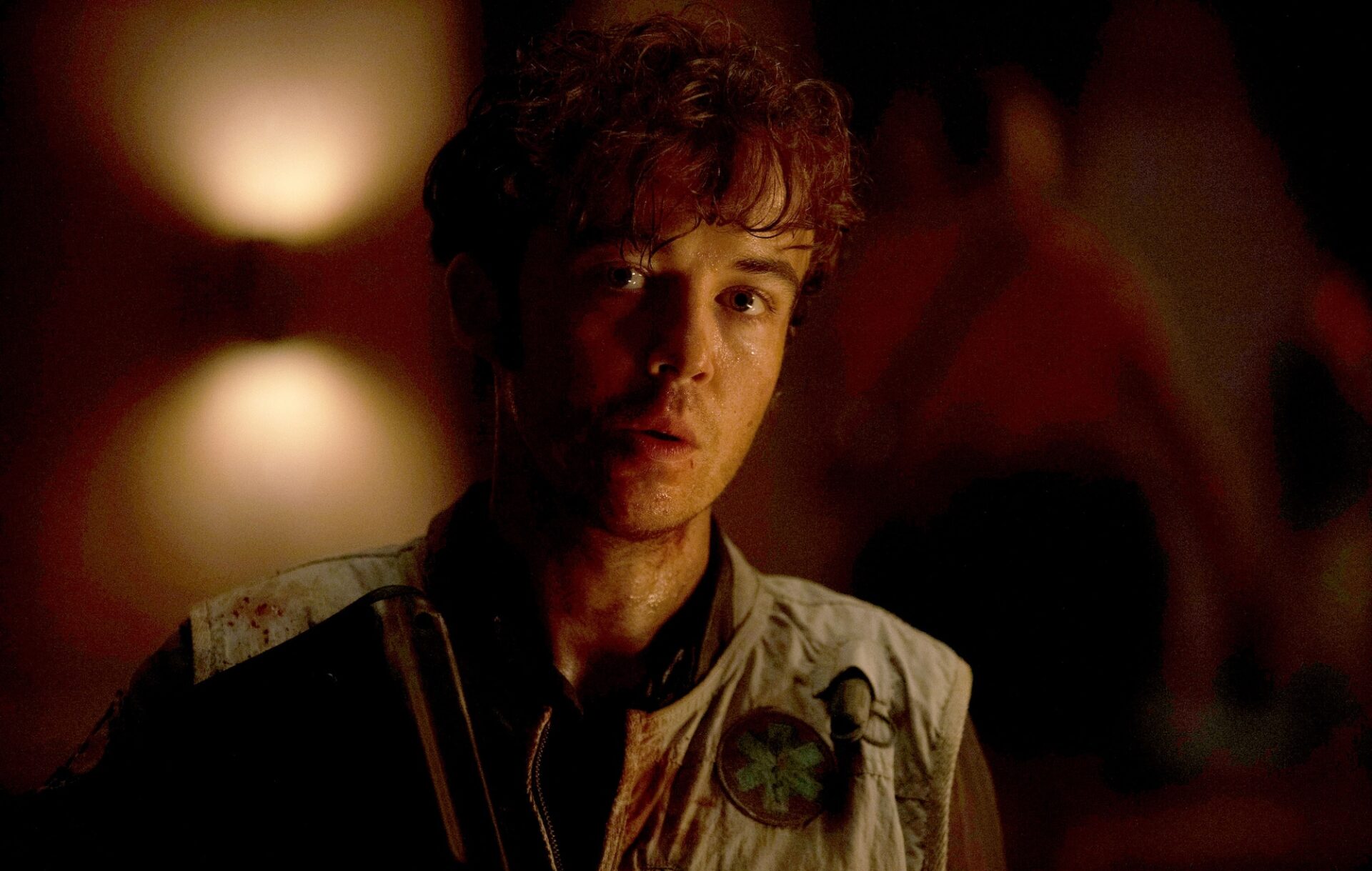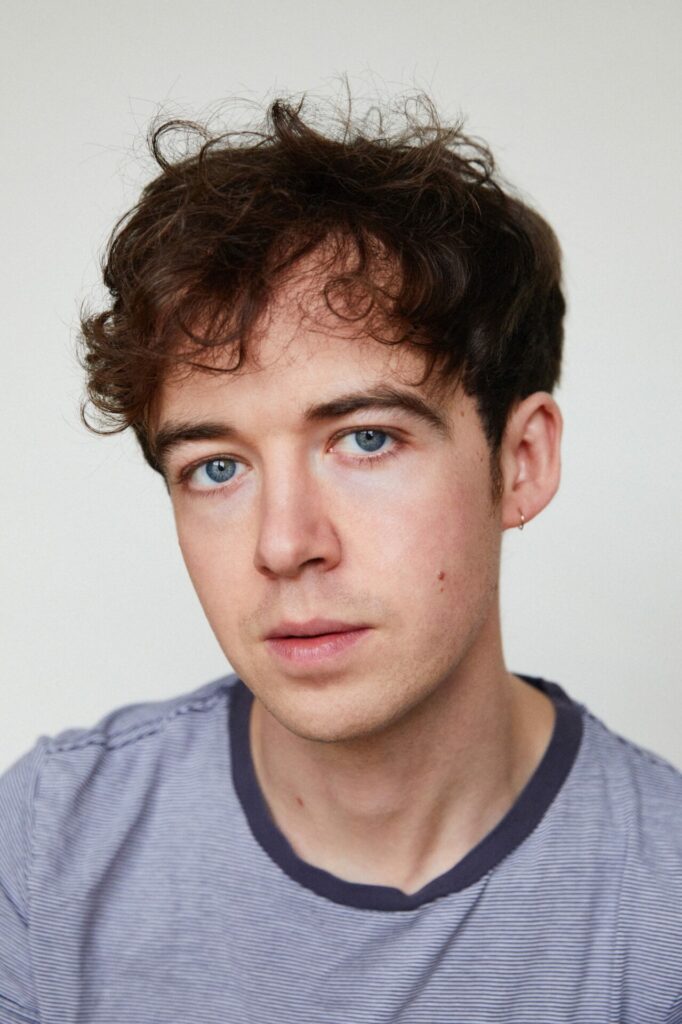‘Alien: Earth’: Alex Lawther’s next frontier
The ‘Andor’ star is embarking on a new intergalactic adventure with his upcoming major role in the sci-fi event of the year
By Al Horner

“It’s always when you’re hungover in Aldi,” laughs Alex Lawther, on a balmy June morning at home in south London. “Or when you’re trying to get on the bus and your card is getting declined and a queue’s forming behind you. That’s when someone will be like: “Hey, you’re that kid from that Black Mirror episode!” The actor — best known for playing twitchy out-siders in The End of the Fucking World, Andor, and yes, one particularly distressing episode of Charlie Brooker’s dystopian tech anthology — is telling Rolling Stone UK about the peculiarity of being recognised in public.
“I’m glad I’ve had it [in] dribs and drabs,” he says, describing how his steady rise through the UK acting ranks since 2010 — a Holby City cameo here, a Franco-English drama there, until eventually the likes of Wes Anderson and Star Wars came calling — has meant a gradual adjustment to fame, rather than an explosion in attention overnight. The good news is that these interactions are more chilled than they once were. The more time that passes since his star-making performance in The End of the Fucking World — a road-trip tale about a teenage animal killer who runs away with a fellow misfit — the more the general public seem to understand that he’s not like his characters. Which, for their sake, is probably for the best, given these characters’ often unhinged energy, pitched somewhere between timid and terrifying. “I’ve had people say they’re surprised I’m not a psychopath,” the 30-year-old — who, for the record, is incredibly polite, thoughtful and curious — admits with a chuckle.
The bad news is, he may soon find it even harder than ever to pick up hangover supplies unnoticed, as this summer sees Lawther take on a pivotal role in Alien: Earth. The blood-splattered, big-budget arrival of one of science-fiction’s most fearsome beasts on the small screen has been heralded as one of the TV events of 2025 by the franchise’s army of supporters.
Lawther has appeared in major releases before. In 2021, he appeared in Wes Anderson’s The French Dispatch and historical epic The Last Duel, directed by Ridley Scott (who, incidentally, directed the original Alien). He’s been seen by global audiences prior to this too: The End of the Fucking World accrued an international cult fandom after being licensed by Channel 4 to Netflix, and Andor, of course, was an awards-decorated hit. But in that Star Wars spin-off, Lawther played a character with limited screen time, an impressive cog in a vast, vast story. In Alien: Earth, Lawther is the story, or at least a major part of it. All of which leaves the impression that this show might just send the actor’s career into the stratosphere, past planet LV-426 and beyond.

“There’s this feeling of just dreadfulness,” the actor beams when talking about the series created by Fargo showrunner Noah Hawley. “Dread is in the blood of what Noah has written. But he also found space for these really soft, human, philosophical questions about what it is to be a human. What is it to be a machine?” You get the impression hearing Lawther discuss it that fans who’ve missed Andor’s combination of out-of-this-galaxy action and down-to-Earth adult themes concluding earlier this year, may just have a replacement on their hands — one that happens to feature the same eminently watchable rising star.
On this particular outing in one of pop culture’s biggest science-fiction franchises, arriving hot on the heels of his last, Lawther plays JD — also known as Hermit — a medic thrust into danger after a vessel with some rather troublesome cargo aboard crash-lands on Earth. Rushing in to save him is Wendy, played by Sydney Chandler, JD’s estranged sister, who’s taken on a strange new superpowered synthetic body since the pair last met. “It’s quite inconvenient, to say the least, trying to rekindle your relationship with your sis [while being chased by] a monstrous Xenomorph,” the actor grins.
But the show goes deeper than horror jumpscares and intriguing family dynamics. The unimpeachable power of billionaires, corporations valuing profits over human life, technology running amok — it’s all there in Alien: Earth, which does what this genre does best, says Lawther. “I was reading [speculative fiction author] Ursula K. Le Guin recently. There’s a preface to her book The Left Hand of Darkness where she’s talking about how sci-fi is not about predicting the future. It’s about what’s happening right now. Sci-fi writers aren’t prophets. They’re just really good at talking through the parameters of science and technology and space travel and aliens about what’s going on today.” That’s what Alien: Earth achieves, without tackling it explicitly or feeling like it’s “on a soapbox”, he argues.
What’s going on today, as he puts it, matters deeply to Lawther. The environment is one cause close to his heart, bleeding both into his work (in 2023, he wrote and directed a short film, For People in Trouble, about romance blooming against a backdrop of climate collapse) and into his extracurricular activities (in 2019, he worked with the climate activist movement Extinction Rebellion). He’s also outspoken about so-called ‘conversion therapy’ for the LGTBQ+ community, as well as the destruction of Gaza, co-writing letters to the British government about both issues with other film industry professionals. He says that he doesn’t consciously go after roles that reflect his beliefs. “It’s all sort of accidental and just the luck of casting. But acting is weird, isn’t it? It’s about playing characters and it’s about imagining other lives. You do inevitably bring your body and your thoughts and your brain to the character. There’s an inevitable crossover of the two.”
It moves him when he’s involved in work that inspires real-world debate. In Andor, his character, an idealistic rebel named Karis Nemik, writes a manifesto that echoes across the Empire. “Tyranny requires constant effort. It breaks, it leaks,” read the speech, performed by Lawther. “One single thing will break the siege. Remember this. Try.” It wasn’t just a galaxy far, far away where those words resonated; at the recent No Kings Day protests across the US, hundreds of placards borrowed lines from it.
“It’s really nice that [shows and movies] can galvanise in that way — that, with Andor, for example, Tony [Gilroy, showrunner] made something that was able to bring people together to talk about it all,” Lawther offers. Asked if he believes that films and TV shows can change the world, he pauses for a moment. “I think sometimes as actors, we can think that maybe our work is more directly important than it is in a way, and we can get sort of a bit lost in that feeling. I’ve done work [before] and thought, ‘This is going to change the world.’ What I’ve realised is it’s not our work that changes the world. It’s the people that are watching it that might change the world. Maybe in response to what they’ve seen. Maybe they’re continuing a conversation from it and deepening that conversation.”
Talk of changing the world is a far cry from where this all began for Lawther, when all he hoped for was to not spend his entire career dressed in Regency-era attire. “When I first started out, I was worried about doing endless period dramas,” he tells me. Back then, he was still emerging from what he’s previously called the “white middle-class bubble” of an adolescence spent in quiet Hampshire. Aged 16, he stumbled into an open audition for a new play by David Hare at the Chichester Festival Theatre. Even after he won the role, he struggled to think of himself as an actor. It was only when an offer to play a young Alan Turing in Hollywood drama The Imitation Game that it all started to feel real. Being named the London Film Critics’ Circle Young British Performer of the Year for just three days’ work on that movie may have helped matters there.
Fifteen years later, on the brink of one of the biggest showcases for his talents yet, Lawther’s learned to enjoy himself and play things somewhat by ear.
Later today, he’ll hop on public transport once more — hopefully his bank card works this time, before being outed as that guy from Black Mirror — to go and watch his Alien: Earth co-star Samuel Blenkin in a performance of Radiohead vs Shakespeare mash-up Hamlet Hail to the Thief. On Saturday, he’ll head to Vancouver to star in a top-secret new project. Beyond that, he has an impressive new short film, Rhoda, ready for release that further announces him as a promising new talent behind the camera too. He also plans to make his first feature film soon.
Till then, he’s operating with a freeness and spontaneity that his jittery characters would find… well, if you’ll excuse the pun, a little bit alien. “I just pray to find good writing and also hopefully do some good writing of my own,” says the actor.
The End of the Fucking World? That was just the beginning. Now there’s new worlds for Lawther to conquer, in this solar system and the next.
Taken from the August/September issue of Rolling Stone UK, out now. Subscribe to the magazine here.
